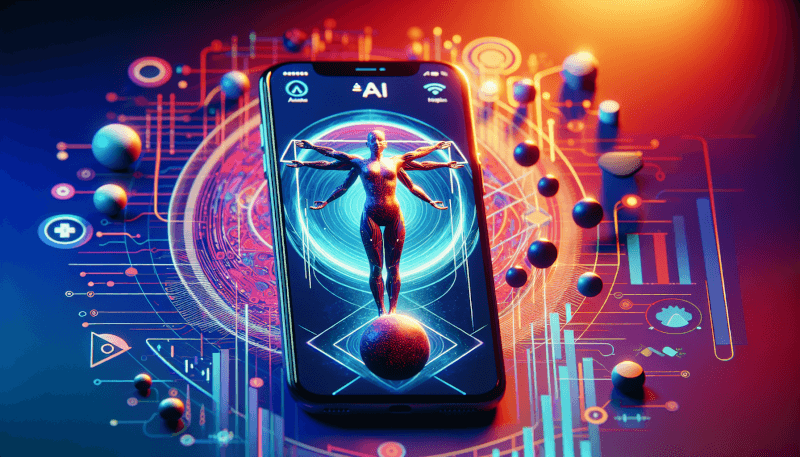In the world of fitness, technology continues to play an increasingly important role in helping us reach our health goals. From tracking our steps to monitoring our heart rate, there seems to be an app for everything. But with the rise of AI-powered fitness apps, the game has changed. These apps not only automate certain processes, but they also provide personalized recommendations and guidance. This article explores the delicate balance between automation and personalization in AI-powered fitness apps, highlighting the benefits and potential challenges that come with this new wave of innovation.
The Rise of AI-Powered Fitness Apps
With the rapid advancement of technology, AI-powered fitness apps have emerged as a popular choice for fitness enthusiasts seeking guidance, personalization, and convenience. These apps integrate artificial intelligence to revolutionize the way we approach workouts, tracking, and overall fitness management. By combining automation and personalization, AI-powered fitness apps offer a comprehensive solution tailored to individual needs and goals.
Integration of AI in Fitness Apps
The integration of AI in fitness apps has revolutionized the way we approach our fitness journeys. By leveraging AI algorithms and machine learning, these apps are able to analyze vast amounts of data to provide intelligent insights and recommendations. This integration allows users to receive personalized workout plans, track their progress, and access customized motivational features all within a single platform.

Advantages of AI-powered Fitness Apps
One of the significant advantages of AI-powered fitness apps is the automation they offer. These apps can provide automated workout suggestions based on user preferences, fitness levels, and goals. This automation saves time and effort by eliminating the need for manual research and planning. Additionally, AI-powered apps automate tracking and monitoring, making it easier for users to stay on top of their fitness goals without the hassle of manual input.
Another advantage is the personalization aspect of AI-powered fitness apps. These apps can create personalized workout plans tailored to individual needs, taking into account factors such as fitness level, body type, and specific goals. Additionally, AI algorithms can track progress on an individual basis, offering insights and recommendations based on real-time data. This level of personalization enhances user engagement and motivation, leading to more successful fitness journeys.
Challenges for AI-powered Fitness Apps
Although AI-powered fitness apps offer numerous benefits, there are also challenges that developers and users need to consider. One of the main challenges is finding the perfect balance between automation and personalization. While automation can save time and effort, it is crucial not to compromise the individuality and specific needs of each user. Striking the right balance requires developers to continuously adapt to user preferences and feedback.
Privacy and data security concerns also present a significant challenge. AI-powered fitness apps collect vast amounts of user data, including personal information, biometrics, and workout history. Ensuring the privacy and security of this data is of utmost importance to protect user confidentiality. Developers must implement robust security measures and follow data protection regulations to mitigate the risks of data breaches.

Automation in AI-Powered Fitness Apps
Automated Workout Suggestions
With AI-powered fitness apps, users can bid farewell to the days of browsing through endless workout routines. These apps leverage AI algorithms to provide automated workout suggestions tailored to individual needs and goals. By analyzing user preferences, fitness levels, and available equipment, these apps create personalized workout plans that keep users engaged and motivated.
Automated Tracking and Monitoring
Gone are the days of manually tracking workouts and progress. AI-powered fitness apps automate tracking and monitoring, making it easier for users to stay on top of their fitness journey. These apps utilize sensors, wearables, and mobile devices to collect data such as heart rate, calories burned, and exercise duration. By automating this process, users can focus on their workouts while the app does the tracking for them.
Automated Data Analysis
AI-powered apps take data analysis to the next level. By leveraging machine learning algorithms, these apps can analyze vast amounts of user data to extract valuable insights and trends. This automated data analysis helps users understand their progress, identify areas for improvement, and receive tailored recommendations. With AI-powered apps, users can make informed decisions based on data-driven insights.
Personalization in AI-Powered Fitness Apps
Personalized Workout Plans
AI-powered fitness apps excel in the realm of personalization by creating tailored workout plans. These apps take into account factors such as fitness level, body type, and specific goals to generate personalized workouts. Whether you’re a beginner looking to build strength or an experienced athlete targeting specific muscle groups, AI-powered apps can create a workout plan that suits your needs and preferences.
Individualized Progress Tracking
Tracking progress is an essential aspect of any fitness journey. AI-powered fitness apps offer individualized progress tracking, allowing users to monitor their performance in real-time. These apps utilize AI algorithms to analyze data such as workout duration, intensity, and repetition to provide accurate insights into progress. With individualized tracking, users can celebrate milestones, set achievable goals, and make adjustments to their routines as needed.
Customized Motivational Features
Staying motivated is crucial for maintaining a consistent fitness routine. AI-powered fitness apps can provide customized motivational features to keep users engaged and motivated. These features may include personalized reminders, goal-setting functionalities, and even virtual rewards for achieving milestones. By tailoring motivation to individual preferences and goals, AI-powered apps enhance the user experience and help users stay on track.

The Role of AI in Balancing Automation and Personalization
Finding the Perfect Balance
Achieving the perfect balance between automation and personalization is a key focus for AI-powered fitness apps. While automation streamlines the fitness journey, personalization ensures that each user’s specific needs and goals are met. Striking this balance requires continuous feedback and adaptation from developers to deliver a holistic fitness experience that caters to individual preferences.
Adapting to User Preferences
AI-powered fitness apps need to adapt to user preferences to maintain a personalized experience. These apps can learn from user interactions, feedback, and performance data to refine workout suggestions and tracking capabilities. By adapting to user preferences, AI-powered apps can deliver a tailored fitness journey centered around individual needs and goals.
Utilizing Machine Learning Algorithms
Machine learning algorithms play a vital role in ensuring the success of AI-powered fitness apps. These algorithms allow the apps to learn from user data, analyze patterns, and make intelligent recommendations. By continuously refining their algorithms, developers can improve the accuracy of workout suggestions, tracking capabilities, and overall user experience.
Privacy and Data Security Concerns
Data Collection and Privacy
AI-powered fitness apps collect a wide range of user data, raising concerns about privacy and data protection. Developers must prioritize user privacy by implementing robust data collection practices and clearly explaining how user data is used. Apps should provide transparent privacy policies, obtain user consent for data collection, and anonymize data whenever possible to ensure user confidentiality.
Protecting User Data from Breaches
Data breaches pose a significant threat to user trust in AI-powered fitness apps. Developers must implement stringent security measures to safeguard user data from unauthorized access. This includes encryption techniques, secure storage protocols, and regular vulnerability assessments. By prioritizing data security, developers can minimize the risks of breaches and maintain user confidence in their apps.
Ensuring Secure Data Storage
Storing user data securely is essential in AI-powered fitness apps. Developers should adhere to industry best practices for data storage, including using secure servers and encrypted databases. Regular backups and multiple layers of authentication can further enhance data security. By prioritizing secure data storage, developers can ensure that user data remains protected at all times.

User Experience and Feedback
Improving User Interface and Interaction
User experience is a key factor in the success of AI-powered fitness apps. These apps should provide an intuitive user interface that is easy to navigate and understand. Clear instructions, visually appealing designs, and streamlined interactions contribute to a positive user experience. Developers should continuously seek feedback from users to identify areas of improvement and refine the user interface accordingly.
Incorporating User Feedback for Enhancements
User feedback plays a crucial role in enhancing AI-powered fitness apps. Developers should actively seek feedback from users through surveys, reviews, and support channels. This feedback can provide valuable insights into user preferences, pain points, and areas for improvement. By incorporating user feedback, developers can make informed enhancements that cater to user needs and enhance the overall app experience.
Engaging and Motivating User Experience
AI-powered fitness apps need to engage and motivate users throughout their fitness journey. Features such as progress tracking, milestone celebrations, and challenges can enhance user engagement. Additionally, integrating social features that allow users to connect with friends and share achievements can further enhance motivation. By creating an engaging and motivating user experience, AI-powered fitness apps can promote long-term adherence to fitness goals.
Training and Machine Learning Models
Data Gathering for AI Models
Training AI models requires significant amounts of data. Fitness apps gather data from multiple sources, including user inputs, wearables, and sensors. This data is used to train machine learning models and improve the accuracy of workout suggestions and tracking capabilities. Developers should ensure that data gathering methods are transparent, and user consent is obtained prior to data collection.
Training ML Models for Personalization
Machine learning models are at the core of personalization in AI-powered fitness apps. These models are trained to analyze user data, identify patterns, and make intelligent recommendations. Developers should invest in continually training and fine-tuning their machine learning models to ensure personalized workout plans and accurate progress tracking.
Continual Model Improvement
The training of machine learning models doesn’t end after initial development. To ensure the best possible performance, developers should focus on continual model improvement. This includes incorporating user feedback, monitoring model performance, and updating the models to reflect the latest research and developments. By continually improving their machine learning models, developers can provide the highest level of personalization and accuracy.

Real-Time Analysis and Feedback
Real-Time Feedback on Workouts
AI-powered fitness apps excel in providing real-time feedback on workouts. These apps can analyze sensor data, such as heart rate and motion, to provide instant feedback on form, intensity, and technique. Real-time feedback helps users make adjustments during their workouts to optimize performance and reduce the risk of injury. This valuable information empowers users to make immediate changes and achieve optimal results.
Adjusting and Improving Performance
Real-time analysis allows AI-powered fitness apps to adjust and improve performance as the user progresses. By collecting and analyzing data during workouts, these apps can identify areas for improvement and provide personalized recommendations. Adjustments can be made to intensity, duration, or specific exercises to optimize performance and help users reach their fitness goals.
Providing Actionable Insights
AI-powered fitness apps offer actionable insights based on real-time analysis of user data. These insights may include recommendations for adjusting workouts, changing exercise routines, or incorporating new training techniques. By providing actionable insights, these apps empower users to make informed decisions and proactively improve their fitness journey.
Integration of Wearable Devices
Seamless Device Integration
AI-powered fitness apps seamlessly integrate with wearable devices, such as fitness trackers and smartwatches. This integration enables the automatic transfer of data from these devices to the app, eliminating the need for manual input. Users can track their heart rate, calories burned, and other metrics effortlessly, ensuring accurate monitoring and progress tracking.
Enhancing Tracking Accuracy
By integrating with wearable devices, AI-powered fitness apps enhance the accuracy of tracking. Wearable devices provide precise data on biometrics, exercise duration, and intensity, allowing for more accurate analysis and progress tracking. The combination of AI algorithms and wearable device integration ensures users have access to reliable and accurate information regarding their fitness journey.
Improving User Experience
The integration of wearable devices improves the overall user experience of AI-powered fitness apps. Users no longer need to manually input data, as the app seamlessly collects information from their wearable devices. This streamlined experience saves time and effort and ensures a hassle-free fitness journey. By integrating wearable devices, AI-powered apps enhance user satisfaction and convenience.
Combining AI with Human Coaching
AI as a Supplement to Human Coaches
AI-powered fitness apps can complement human coaching by providing additional support and guidance. While human coaches offer personalized advice and expertise, AI-powered apps can provide ongoing support, tracking, and progress monitoring. This combination allows users to benefit from the best of both worlds, receiving the personalized attention of a coach alongside the convenience and accessibility of an app.
Efficient Coaching Time Management
AI-powered fitness apps can help human coaches manage their coaching time more efficiently. By automating certain aspects, such as workout tracking and progress monitoring, coaches can focus on providing personalized guidance and instruction. This efficient time management enables coaches to have a greater impact and support a larger number of clients.
Enhanced Collaboration and Support
The combination of AI and human coaching leads to enhanced collaboration and support for users. AI-powered fitness apps can provide a platform for communication between coaches and clients, ensuring ongoing guidance and monitoring. Users can receive personalized feedback and recommendations while coaches gain valuable insights into their clients’ progress. This collaboration creates a supportive and dynamic environment for users to achieve their fitness goals.
In conclusion, AI-powered fitness apps have transformed the fitness industry by integrating automation and personalization. These apps offer automated workout suggestions, tracking capabilities, and data analysis, saving time and effort for users. At the same time, they provide personalized workout plans, individualized progress tracking, and customized motivational features to enhance the user experience. Privacy and data security concerns must be addressed, and user feedback is crucial for continuous improvement. By finding the perfect balance between automation and personalization, AI-powered fitness apps revolutionize the way we approach our fitness journeys, improving engagement, and helping users achieve their goals.

